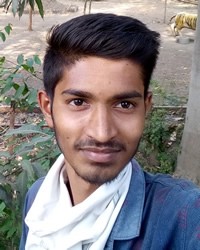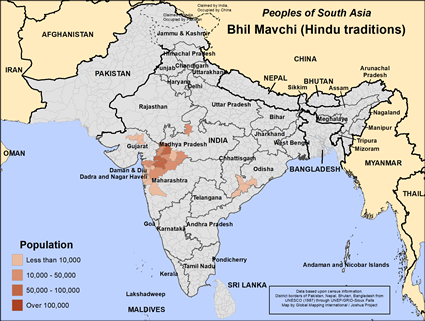The Mavchi Bhil are an indigenous people who live in Madhya Pradesh, Maharashtra and Gujarat, all central and western states of India. They are classified as a scheduled tribe meaning that they are eligible for public jobs and special consideration for university admission. Most Mavchi reside in forests and hills much like their ancestors. The Mavchi speak a number of languages depending on where they live in India. These languages include Mawchi, Bhili, Hindi, and Marathi. A tiny number of Mavchi have become followers of Jesus Christ.
Most Mavchi make their living working as agricultural laborers often on land that they do not own. Hunting, fishing and logging are also ways they make money or obtain food for their families. Women add to their income by making mats and bamboo items. Some work as domestics. Unfortunately, most Mavchi are unable to read and write. Illiteracy is especially high among the women. Children frequently quit school early to help their parents in the fields. Educated Mavchi have become teachers, physicians, merchants, and administrators. The Mavchi marry within their Bhili group. Cousin marriages are common. Monogamy or marriage to one spouse is the norm. Families arrange marriages. The girls are often married off at the young age of 11 or 12. Boys marry in their late teens. Newly wedded couples live with the groom's family. Sons inherit their father's property. Each village has its own priests and shrines. Village elders settle legal disputes and promote the Mavchi's interests. The Mavchi are not vegetarians but as Hindus they do not eat beef.
The Mavchi practice Hinduism, the ancient religion of India with a strong element of folk religion. They worship and serve the gods of the Hindu pantheon. Hindus believe that by performing rituals and good works that they will attain moksha or freedom from the endless cycle of birth, death and rebirth. The Mavchi visit Hindu shrines and offer prayers, food, flowers, and incense to their gods in hopes of gaining protection and benefits. They do not have a personal or familial relationship with their gods as Christians do. There are many forms of Hinduism, each with its own deities and beliefs. The main yearly holidays of the Mavchi people are Holi, the festival of colors and the start of spring, Diwali, the festival of lights, Navratri, the celebration of autumn and Rama Navami, Rama's birthday. The caste system divides Hindus into four main categories. The lowest communities like the Mavchi are outside of the caste system.
As an impoverished tribal people, the Mavchi have many spiritual and physical needs. They need good schools and teachers for their children. The adults need to learn new job skills to escape the cycle of poverty. Most of all the Mavchi need to hear and understand the gospel of Christ. He alone can forgive their sins and grant them eternal life.
Pray that Indian believers will take the good news to the Mavchi Bhil. Pray that God will raise up pastors, evangelists and church planters to serve the Mavchi Bhils. Pray that God's blessings will become a reality in the lives of the Mavchi as they seek Him. Pray an unstoppable movement to Christ begin among Mavchi villages and families.
Scripture Prayers for the Bhil Mavchi (Hindu traditions) in India.
| Profile Source: Keith Carey |











